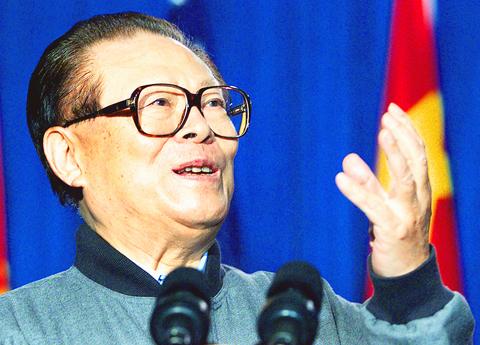US President George W. Bush and Chinese President Jiang Zemin (
Bush said both China and the US "will continue to work toward a nuclear weapons-free Korean peninsula, and a peaceful resolution of this issue."
Jiang echoed Bush's comments as the two leaders met at Bush's Texas ranch, a summit initially arranged as a farewell for the Asian leader, who is leaving office, but changed by quick-moving events in North Korea.

PHOTO: REUTERS
The two also discussed Iraq, another point dividing the United States and China.
The Bush administration wants a UN resolution that holds out the threat of military action unless Saddam Hussein disarms. China, Russia and France are cool to language that suggests the use of force.
Bush said he would not accept a weak resolution.
"Let me put it bluntly: There must be consequences," Bush said.
On human rights, another sensitive issue between the two countries, Jiang said he had expressed to Bush "my views on the importance of China freeing prisoners of conscience, giving fair treatment to peoples of faith and preserving the rights of Hong Kong's citizens.
"I also spoke of the importance of respecting human rights in Tibet and encouraged more dialogue with Tibetan leaders," Jiang said.
Bush said Vice President Dick Cheney will visit China in the spring.
Due to bad weather,the news conference was held in a metal hangar that normally stores Marine One, Bush's helicopter.
The Chinese president's six-car motorcade pulled up the gravel driveway of Bush's ranch here, 30 minutes behind schedule. "How are you, sir," said Bush as he peered in to Jiang's car. First lady Laura Bush took the hand of Jiang's wife: "Welcome to our home."
The famously punctual Bush had been kept waiting in the cold on the porch of his home, glancing at his watch and growing antsy before heading back inside with the first lady.
Jiang, preparing to move to a lesser but still undefined role in the Chinese hierarchy, sought improved ties with the US as a major achievement of his 13-year rule.
But concerns over North Korea loomed large over the meeting.
The administration believes economic pressure from a variety of countries is a possible key to easing the perceived dangers created by the North's nuclear activities. The US has been providing North Korea with more than 500,000 tons a year of heavy oil as part of an international energy assistance program. The administration has not said whether it will halt these shipments.
Washington has demanded an immediate and visible dismantling of the North's nuclear facilities, suggesting that it is not interested in bargaining with Pyongyang over the issue.
North Korea said early Friday that it wanted a "nonaggression treaty" with the United States, but warned it was entitled to possess nuclear weapons as long as it felt threatened by the US nuclear arsenal.
In response, White House spokesman Scott Stanzel said: "Our position with respect to disarmament of North Korea's weapons of mass destruction is clear."

A magnitude 7.0 earthquake struck off Yilan at 11:05pm yesterday, the Central Weather Administration (CWA) said. The epicenter was located at sea, about 32.3km east of Yilan County Hall, at a depth of 72.8km, CWA data showed There were no immediate reports of damage. The intensity of the quake, which gauges the actual effect of a seismic event, measured 4 in Yilan County area on Taiwan’s seven-tier intensity scale, the data showed. It measured 4 in other parts of eastern, northern and central Taiwan as well as Tainan, and 3 in Kaohsiung and Pingtung County, and 2 in Lienchiang and Penghu counties and 1

FOREIGN INTERFERENCE: Beijing would likely intensify public opinion warfare in next year’s local elections to prevent Lai from getting re-elected, the ‘Yomiuri Shimbun’ said Internal documents from a Chinese artificial intelligence (AI) company indicated that China has been using the technology to intervene in foreign elections, including propaganda targeting Taiwan’s local elections next year and presidential elections in 2028, a Japanese newspaper reported yesterday. The Institute of National Security of Vanderbilt University obtained nearly 400 pages of documents from GoLaxy, a company with ties to the Chinese government, and found evidence that it had apparently deployed sophisticated, AI-driven propaganda campaigns in Hong Kong and Taiwan to shape public opinion, the Yomiuri Shimbun reported. GoLaxy provides insights, situation analysis and public opinion-shaping technology by conducting network surveillance

‘POLITICAL GAME’: DPP lawmakers said the motion would not meet the legislative threshold needed, and accused the KMT and the TPP of trivializing the Constitution The Legislative Yuan yesterday approved a motion to initiate impeachment proceedings against President William Lai (賴清德), saying he had undermined Taiwan’s constitutional order and democracy. The motion was approved 61-50 by lawmakers from the main opposition Chinese Nationalist Party (KMT) and the smaller Taiwan People’s Party (TPP), who together hold a legislative majority. Under the motion, a roll call vote for impeachment would be held on May 19 next year, after various hearings are held and Lai is given the chance to defend himself. The move came after Lai on Monday last week did not promulgate an amendment passed by the legislature that

Taiwan is gearing up to celebrate the New Year at events across the country, headlined by the annual countdown and Taipei 101 fireworks display at midnight. Many of the events are to be livesteamed online. See below for lineups and links: Taipei Taipei’s New Year’s Party 2026 is to begin at 7pm and run until 1am, with the theme “Sailing to the Future.” South Korean girl group KARA is headlining the concert at Taipei City Hall Plaza, with additional performances by Amber An (安心亞), Nick Chou (周湯豪), hip-hop trio Nine One One (玖壹壹), Bii (畢書盡), girl group Genblue (幻藍小熊) and more. The festivities are to